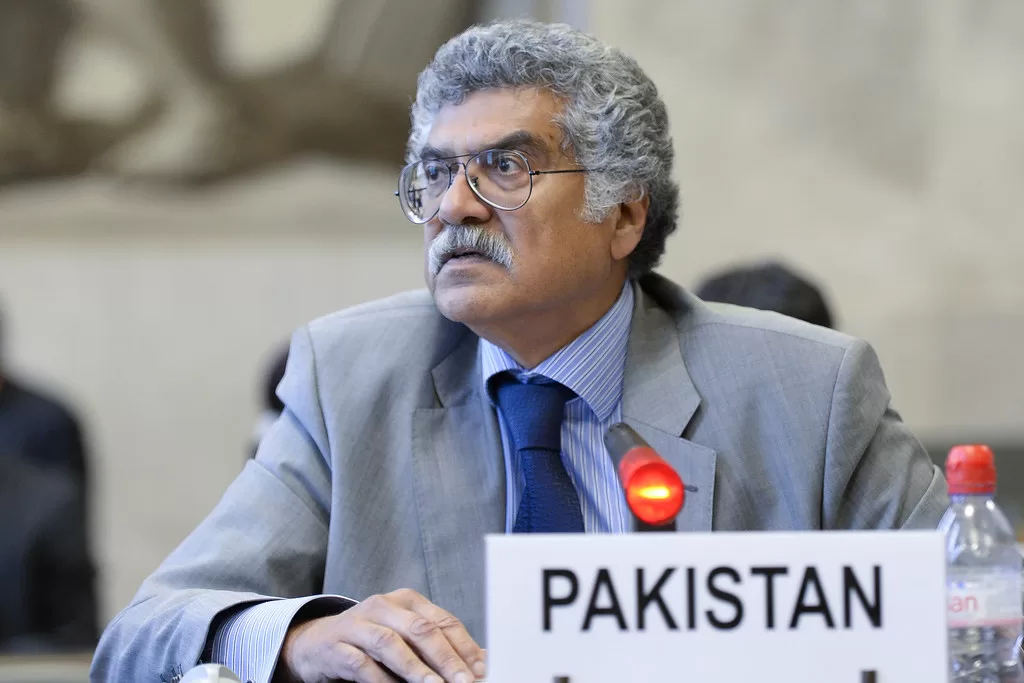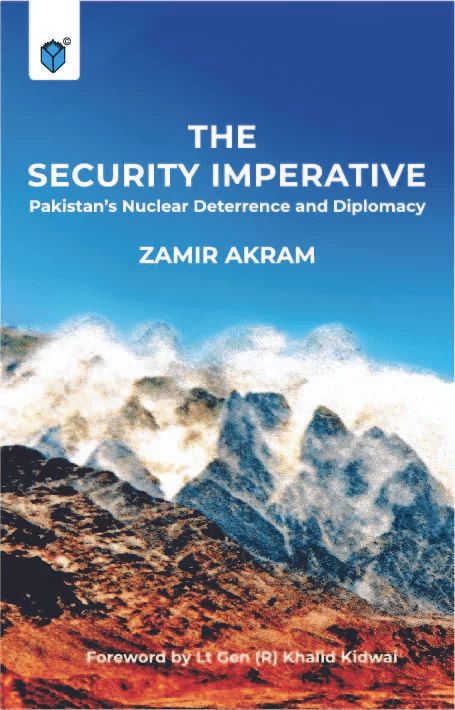Zamir Akram, The Security Imperative: Pakistan’s Nuclear Deterrence and Diplomacy (Karachi: Paramount Books, 2023) ISBN: 978-969-210-917-8 (Pages: xxxvii, 457).
The post-nuclearized era of South Asian politics dragged the attention of the international academic community towards changing patterns of New Delhi-Islamabad strategic competition under the nuclear shadows. In this scenario, the international strategic community started expressing their varying viewpoints on the South Asian nuclearized regional politics. Akin to the emerging interests of different writers on South Asian nuclear politics, the contesting positions of Indian and Pakistani authors have always remained important in understanding the regional security environment of South Asia and its dependence on the evolving nuclear politics between New Delhi and Islamabad.
The book under review is written by a Pakistani author who served in different key positions of various multilateral frameworks of the international community. During his stay in many international forums, he presented Islamabad’s policies concerning the issues of arms control and disarmament. The author Zamir Akram is a prominent figure in Islamabad’s nuclear diplomacy due to his vast experience of serving as one of the leading ambassadors of Pakistan. From 2008 to 2015, he became Pakistan’s Permanent Representative to the United Nations parallel to defending Islamabad’s formal standing on issues of human rights and humanitarian affairs at various intergovernmental apparatus of the international community. He proved to be a significant personality in representing his country at different international forums while presenting impartial and balanced views about the changing dynamics of global strategic politics and its impacts on South Asia. The professional capabilities of Zamir Akram have been formally acknowledged and appreciated by several international authorities. In 2007, he was granted the Star of Merit award by the State of Palestine in recognition of his active support and solidarity with the Palestinian people. In Pakistan, he served as the Additional Foreign Secretary in the Prime Minister’s Office from 2004 to 2008. The four-year stay of Ambassador Akram in the Prime Minister’s Office enabled government authorities to realize his potential in the areas of foreign relations and security policies. In this way, the book The Security Imperative is a reflection of Zamir Akram’s intellectual insight on Islamabad’s leading security imperatives, and efforts to ensure a stable regional deterrence.

Zamir Akram – Author of the Book, ‘The Security Imperative’
The central theme of the book comprises fourteen chapters, in addition to a few introductory pages describing the main structure of the book and nature of arguments concerning the author’s personal perspective on Islamabad’s relevance with the concept of nuclear diplomacy. The first chapter provides a comprehensive survey of Pakistan’s security imperative which is shaped by the politics of regional and international security environments. The issues related to Islamabad’s relation with New Delhi, Kabul, and Washington have been described in this chapter while explaining the role of history, and the issues of terrorism and nuclear politics, structuring the contemporary security mindset of Islamabad. The subsequent five chapters emphasize the historical survey of Pakistan’s nuclear efforts parallel to highlighting the major turning points of Islamabad’s nuclear journey. The other chapters debate on different aspects of India-Pakistan strategic competition and the role of external players in intensifying the multi-layered hostile interaction between two South Asian nuclear powers.
The interesting part of the debate appears in the seventh chapter in which the author outlines the doctrinal features of the New Delhi-Islamabad nuclear contest. The fundamental elements of Pakistan’s nuclear doctrine based on the concept of Credible Minimum Deterrence, to establish deterrence against India, are the main points of the seventh chapter’s debate (p. 182). In addition, the eleventh chapter also outlines the doctrinal upgradations in South Asia and Islamabad’s strategic posture linked with the concept of Full Spectrum Deterrence (FSD). The book’s last two chapters ended the discussion by highlighting the future challenges mainly associated with the prevalence of hybrid warfare in South Asia and the security challenges originating from post-US-withdrawal Afghanistan. The debate in all the chapters represents the author’s personal way of looking at South Asian nuclear politics and the Indian quest for securing strategic dominance in its competition with Pakistan. The US greater South Asian policy plays a significant role in supporting and advocating the Indian position in the regional and extra-regional affairs of South Asia which mainly connects New Delhi with the broader Asian power politics, revolving around China’s economic rise, according to the book’s analysis. In this way, this book offers a first-hand diplomatic account of Pakistan’s nuclear history, separating facts from fiction and shedding light on the country’s nuclear deterrence and diplomacy efforts. It is an academic account of a career diplomat who analysed Pakistan’s nuclear posture in the context of regional dynamics, including its relationships with neighbouring countries and strong ties with the extra-regional powers. It could be considered an essential reading for the South Asian strategic community and the Islamabad-based political and academic authorities involved in the policymaking frameworks of the government. Moreover, it is an appropriate book for the global academic communities interested in updating their understanding of Pakistan’s position in the ongoing South Asian nuclear politics and the factors shaping Islamabad’s specific strategic posture against potential security threats.





